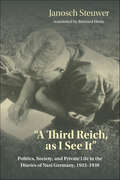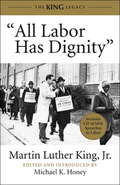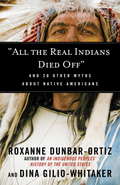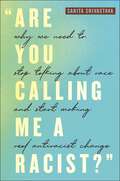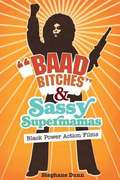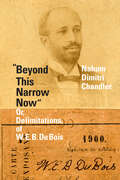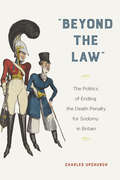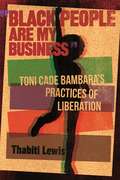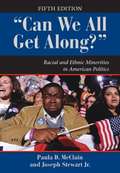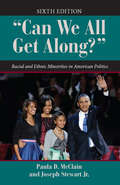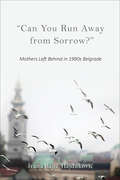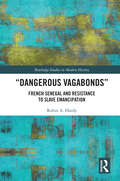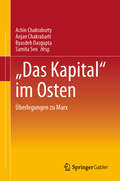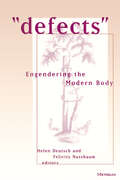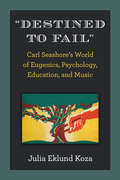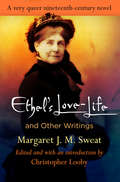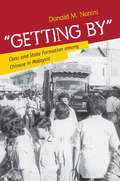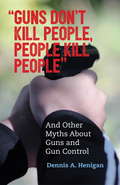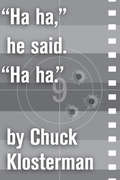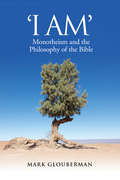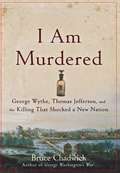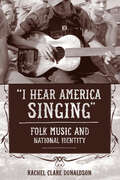- Table View
- List View
"A Third Reich, as I See It": Politics, Society, and Private Life in the Diaries of Nazi Germany, 1933–1939
by Janosch SteuwerWith the beginning of the National Socialist dictatorship, Germany not only experienced a deep political turning point but the private life of Germans also changed fundamentally. The Nazi regime had far-reaching ideas about how the individual should think and act.In "A Third Reich, as I See It" Janosch Steuwer examines the private diaries of ordinary Germans written between 1933 and 1939 and shows how average citizens reacted to the challenges of National Socialism. Some felt the urge and desire to adapt to the political circumstances. Others felt compelled to do so. They all contributed to the realization of the vision of a homogeneous, conflict-free, and "racially pure" society.In a detailed manner and with a convincing sense of the bigger picture, Steuwer shows how the tense efforts of people to fit in, and at the same time to preserve existing opinions and self-conceptions, led to a close intertwining of the private and the political."A Third Reich, as I See It" offers a surprisingly new look at how the ideological visions of National Socialism found their way into the everyday reality of Germans.
"All Labor Has Dignity"
by Martin Luther King Michael K. HoneyAn unprecedented and timely collection of Dr. King's speeches on labor rights and economic justice Covering all the civil rights movement highlights--Montgomery, Albany, Birmingham, Selma, Chicago, and Memphis--award-winning historian Michael K. Honey introduces and traces Dr. King's dream of economic equality. Gathered in one volume for the first time, the majority of these speeches will be new to most readers. The collection begins with King's lectures to unions in the 1960s and includes his addresses made during his Poor People's Campaign, culminating with his momentous "Mountaintop" speech, delivered in support of striking black sanitation workers in Memphis. Unprecedented and timely, "All Labor Has Dignity" will more fully restore our understanding of King's lasting vision of economic justice, bringing his demand for equality right into the present.ts agenda.
"All the Real Indians Died Off": And 20 Other Myths About Native Americans
by Roxanne Dunbar-Ortiz Dina Gilio-WhitakerUnpacks the twenty-one most common myths and misconceptions about Native AmericansIn this enlightening book, scholars and activists Roxanne Dunbar-Ortiz and Dina Gilio-Whitaker tackle a wide range of myths about Native American culture and history that have misinformed generations. Tracing how these ideas evolved, and drawing from history, the authors disrupt long-held and enduring myths such as: <P><P>"Columbus Discovered America" "Thanksgiving Proves the Indians Welcomed Pilgrims" "Indians Were Savage and Warlike" "Europeans Brought Civilization to Backward Indians" "The United States Did Not Have a Policy of Genocide" "Sports Mascots Honor Native Americans" "Most Indians Are on Government Welfare" "Indian Casinos Make Them All Rich" "Indians Are Naturally Predisposed to Alcohol" <P><P>Each chapter deftly shows how these myths are rooted in the fears and prejudice of European settlers and in the larger political agendas of a settler state aimed at acquiring Indigenous land and tied to narratives of erasure and disappearance. Accessibly written and revelatory, "All the Real Indians Died Off" challenges readers to rethink what they have been taught about Native Americans and history.From the Trade Paperback edition.
"Are You Calling Me a Racist?": Why We Need to Stop Talking about Race and Start Making Real Antiracist Change
by Sarita SrivastavaWinner, 2025 Canadian Sociology Book Award, given by the Canadian Sociological AssociationShows why diversity workshops fail and offers concrete solutions for a path forwardDespite decades of anti-racism workshops and diversity policies in corporations, schools, and nonprofit organizations, racial conflict has only increased in recent years. “Are You Calling Me a Racist?” reveals why these efforts have failed to effectively challenge racism and offers a new way forward.Drawing from her own experience as an educator and activist, as well as extensive interviews and analyses of contemporary events, Sarita Srivastava shows that racial encounters among well-meaning people are ironically hindered by the emotional investment they have in being seen as good people. Diversity workshops devote energy to defending, recuperating, educating, and inwardly reflecting, with limited results, and these exercises often make things worse. These “Feel-Good politics of race,” Srivastava explains, train our focus on the therapeutic and educational, rather than on concrete practices that could move us towards true racial equity. Inthis type of approach to diversity training, people are more concerned about being called a racist than they are about changing racist behavior.“Are You Calling Me a Racist?” is a much-needed challenge to the status quo of diversity training, and will serve as a valuable resource for anyone dedicated to dismantling racism in their communities, educational institutions, public or private organizations, and social movements.
"Baad Bitches" and Sassy Supermamas: Black Power Action Films
by Stephane DunnThis lively study unpacks the intersecting racial, sexual, and gender politics underlying the representations of racialized bodies, masculinities, and femininities in early 1970s black action films, with particular focus on the representation of black femininity. Stephane Dunn explores the typical, sexualized, subordinate positioning of women in low-budget blaxploitation action narratives as well as more seriously radical films like Sweet Sweetback's Baadasssss Song and The Spook Who Sat by the Door, in which black women are typically portrayed as trifling "bitches" compared to the supermacho black male heroes. The terms "baad bitches" and "sassy supermamas" signal the reversal of this positioning with the emergence of supermama heroines in the few black action films in the early 1970s that featured self-assured, empowered, and tough (or "baad") black women as protagonists: Cleopatra Jones, Coffy, and Foxy Brown. Dunn offers close examination of a distinct moment in the history of African American representation in popular cinema, tracing its emergence out of a radical political era, influenced especially by the Black Power movement and feminism. "Baad Bitches" and Sassy Supermamas also engages blaxploitation's impact and lingering aura in contemporary hip-hop culture as suggested by its disturbing gender politics and the "baad bitch daughters" of Foxy Brown and Cleopatra Jones, rappers Lil' Kim and Foxy Brown.
"Beyond This Narrow Now": Or, Delimitations, of W. E. B. Du Bois
by Nahum Dimitri ChandlerIn “Beyond This Narrow Now” Nahum Dimitri Chandler shows that the premises of W. E. B. Du Bois's thinking at the turn of the twentieth century stand as fundamental references for the whole itinerary of his thought. Opening with a distinct approach to the legacy of Du Bois, Chandler proceeds through a series of close readings of Du Bois's early essays, previously unpublished or seldom studied, with discrete annotations of The Souls of Black Folk: Essays and Sketches of 1903, elucidating and elaborating basic epistemological terms of his thought. With theoretical attention to how the African American stands as an example of possibility for Du Bois and renders problematic traditional ontological thought, Chandler also proposes that Du Bois's most well-known phrase—“the problem of the color line”—sustains more conceptual depth than has yet been understood, with pertinence for our accounts of modern systems of enslavement and imperial colonialism and the incipient moments of modern capitalization. Chandler's work exemplifies a more profound engagement with Du Bois, demonstrating that he must be re-read, appreciated, and studied anew as a philosophical writer and thinker contemporary to our time.
"Beyond the Law": The Politics of Ending the Death Penalty for Sodomy in Britain (Sexuality Studies)
by Charles UpchurchIn nineteenth-century England, sodomy was punishable by death; even an accusation could damage a man’s reputation for life. The last executions for this private, consensual act were in 1835, but the effort to change the law that allowed for those executions was intense and precarious, and not successful until 1861. In this groundbreaking book, “Beyond the Law,” noted historian Charles Upchurch pieces together fragments from history and uses a queer history methodology to recount the untold story of the political process through which the law allowing for the death penalty for sodomy was almost ended in 1841. Upchurch recounts the legal and political efforts of reformers like Jeremy Bentham and Lord John Russell—the latter of whom argued that the death penalty for sodomy was “beyond the law and above the law.” He also reveals that a same-sex relationship linked the families of the two men responsible for co-sponsoring the key legislation. By recovering the various ethical, religious, and humanitarian arguments against punishing sodomy, “Beyond the Law” overturns longstanding assumptions of nineteenth-century British history. Upchurch demonstrates that social change came from an amalgam of reformist momentum, family affection, elitist politics, class privilege, enlightenment philosophy, and personal desires.
"Black People Are My Business": Toni Cade Bambara's Practices of Liberation (African American Life Series)
by Thabiti Lewis"Black People Are My Business": Toni Cade Bambara’s Practices of Liberation studies the works of Bambara (1939–1995), an author, documentary filmmaker, social activist, and professor. Thabiti Lewis’s analysis serves as a cultural biography, examining the liberation impulses in Bambara’s writing, which is concerned with practices that advance the material value of the African American experience and exploring the introspection between artist production and social justice. This is the first monograph that focuses on Bambara’s unique approach and important literary contribution to 1970s and 1980s African American literature. It explores her unique nationalist, feminist, Marxist, and spiritualist ethos, which cleared space for many innovations found in black women’s fiction. Divided into five chapters, Lewis’s study relies on Bambara’s voice (from interviews and essays) to craft a "spiritual wholeness aesthetic"—a set of principles that comes out of her practices of liberation and entail family, faith, feeling, and freedom—that reveals her ability to interweave ethnic identity, politics, and community engagement and responsibility with the impetus of balancing black male and female identity influences and interactions within and outside the community. One key feature of Bambara’s work is the concentration on women as cultural workers whereby her notion of spiritual wholeness upends what has become a scholarly distinction between feminism and black nationalism. Bambara’s fiction situates her as a pivotal voice within the Black Arts Movement and contemporary African American literature. Bambara is an understudied and important artistic voice whose aversion to playing it safe both personified and challenged the boundaries of black nationalism and feminism. "Black People Are My Business" is a wonderful addition to any reader’s list, especially those interested in African American literary and cultural studies.
"Can We All Get Along?"
by Paula D. Mcclain Joseph Stewart Jr.In a nation built by immigrants and bedeviled by the history and legacy of slavery and discrimination, issues of liberty, equality, and community continue to challenge Americans. In the fifth edition of this widely acclaimed text, Paula McClain and Joseph Stewart combine traditional elements of political science analysis--history, Constitutional theory, institutions, political behavior, and policy actors--with a fully updated survey of the political status of four major groups: blacks, Latinos, Asian Americans, and American Indians. McClain and Stewart show similarities and differences in these groups' political action and experience, and point the way toward coalition, competition, and consensus building in the face of ongoing conflict. Two dilemmas shape the book: How do we as a nation reconcile a commitment to equality with persistent inequality and discrimination? And what can we do about it--from the perspective of ethnic and racial minorities as well as within the dominant culture? Thoroughly updated following the historic 2008 presidential election, this new edition provides a concise overview of minority politics in America.
"Can We All Get Along?"
by Paula D. Mcclain Joseph Stewart Jr.In a nation built by immigrants and bedeviled by the history and legacy of slavery and discrimination, issues of liberty, equality, and community continue to challenge Americans. In the fifth edition of this widely acclaimed text, Paula McClain and Joseph Stewart combine traditional elements of political science analysis--history, Constitutional theory, institutions, political behavior, and policy actors--with a fully updated survey of the political status of four major groups: blacks, Latinos, Asian Americans, and American Indians. McClain and Stewart show similarities and differences in these groups' political action and experience, and point the way toward coalition, competition, and consensus building in the face of ongoing conflict. Two dilemmas shape the book: How do we as a nation reconcile a commitment to equality with persistent inequality and discrimination? And what can we do about it--from the perspective of ethnic and racial minorities as well as within the dominant culture? Thoroughly updated following the historic 2008 presidential election, this new edition provides a concise overview of minority politics in America.
"Can We All Get Along?"
by Paula D. Mcclain Joseph Stewart Jr.In a nation built by immigrants and bedeviled by the history and legacy of slavery and discrimination, issues of liberty, equality, and community continue to challenge Americans. In the sixth edition of this widely acclaimed text, Paula D. McClain and Joseph Stewart Jr. combine traditional elements of political science analysis--history, Constitutional theory, institutions, political behavior, and policy actors--with a fully updated survey of the political status of four major groups: African Americans, Latinos, Asian Americans, and American Indians. The authors show similarities and differences in these groups’ political action and experience, and point the way toward coalition, competition, and consensus building in the face of ongoing conflict. Two dilemmas shape the book: How do we as a nation reconcile a commitment to equality with persistent inequality and discrimination? And what can we do about it--from the perspective of ethnic and racial minorities as well as within the dominant culture? The sixth edition is thoroughly updated following the 2012 presidential election and provides new coverage of President Obama’s first term including discussions of judicial appointments, the Affordable Care Act, and other policy changes. With increased coverage of native Hawaiians and all new chapter openers, "Can We All Get Along?" continues to provide the most extensive comparative coverage of minority politics in the United States.
"Can We All Get Along?": Racial and Ethnic Minorities in American Politics (5th Revised Edition)
by Joseph Stewart Paula D. Mcclain Jr.In a nation built by immigrants and bedeviled by the history and legacy of slavery and discrimination, issues of liberty, equality, and community continue to challenge Americans. <P><P>In the fifth edition of this widely acclaimed text, Paula McClain and Joseph Stewart combine traditional elements of political science analysis--history, Constitutional theory, institutions, political behavior, and policy actors--with a fully updated survey of the political status of four major groups: blacks, Latinos, Asian Americans, and American Indians. McClain and Stewart show similarities and differences in these groups' political action and experience, and point the way toward coalition, competition, and consensus building in the face of ongoing conflict. Two dilemmas shape the book: How do we as a nation reconcile a commitment to equality with persistent inequality and discrimination? And what can we do about it--from the perspective of ethnic and racial minorities as well as within the dominant culture? Thoroughly updated following the historic 2008 presidential election, this new edition provides a concise overview of minority politics in America.
"Can You Run Away from Sorrow?": Mothers Left Behind in 1990s Belgrade (New Anthropologies Of Europe Ser.)
by Ivana Bajic-HajdukovicThis intimate social history of family life in 1990s Serbia considers how emigration effects the elders left behind.The fall of Yugoslavia in the 1990s led citizens to look for better, more stable lives elsewhere. For the older generations, however, this wasn’t an option. In this powerful work, Ivana Bajic-Hajdukovic reveals the impact that waves of emigration from Serbia had on family relationships and, in particular, on elderly mothers who stayed.With nowhere to go, and any savings given to their children to help establish new lives, these seniors faced a crumbling economy, waves of refugees entered from Croatia and Bosnia-Herzegovina, NATO bombings, and the trial and ouster of Slobodan Milosevic. Bajic-Hajdukovic explores the transformations of family relationships and daily life practices in people’s homes, from foodways and childcare to gift exchanges.“Can You Run Away from Sorrow?” illustrates not only the tremendous sacrifice of parents, but also their profound sense of loss—of their families, their country, their stability and dignity, and most importantly, of their own identity and hope for what they thought their future would be.
"Dangerous Vagabonds": French Senegal and Resistance to Slave Emancipation (Routledge Studies in Modern History)
by Robin A. Hardy"Dangerous Vagabonds" examines the problem of illicit slavery in Senegal following the 1848 emancipation law. Where traditional scholarship relates its persistence to the economic and logistic pressures in the region, as well as a strong indigenous tradition of forced labor, this study goes further to show that inherent factors within the culture of French colonialism made abolishing the institution exceedingly difficult.In 1848, when slavery was abolished across greater France, the practice remained virtually intact in the French colony of Senegal on the west coast of Africa. Slavery would continue to be practiced in the colony and its expanding borderlands until at least 1905, when this study ends. This work takes a multi-faceted approach by examining three aspects of French imperial culture that mitigated slave freedom in Senegal: the views of race and slavery maintained by Senegal’s influential métis (mixed-race) population; French ethnological assessments of the aptitude and capabilities of black West Africans; and related, a trend within French political culture to deny metropolitan rights to the non-white colonized—a phenomenon that intensified in far-flung French territories that were not completely under French control, and where few whites resided.In complexifying post-colonial literature of West Africa, this study will be a useful resource to students and scholars of the history of slavery, colonial history, and West African studies.
"Das Kapital“ im Osten: Überlegungen zu Marx
by Samita Sen Anjan Chakrabarti Achin Chakraborty Byasdeb DasguptaDieses Buch verfolgt einen marxistischen Ansatz mit dem Schwerpunkt auf der Klasse, um über Marx' Kapital im Kontext des Ostens nachzudenken. Es nimmt eine kritische Neubewertung einiger vertrauter Konzepte im Kapital vor und arbeitet Themen heraus, die an dessen Rand liegen. In verschiedenen Aufsätzen wird dieses Grenzgebiet erkundet, um neueKonzepte und Analysemethoden für Marx' Abhandlung im 21. Jahrhundert zu fördern. Jahrhundert voranzutreiben. Damit stellt es einen Fortschritt in der Marxschen Theorie und Politik dar.Das Buch untersucht das Kapital von Marx aus der Perspektive und dem Blickwinkel des Ostens und konzentriert sich auf viele Themen, die an den "Grenzen" des Kapitals liegen, das sich hauptsächlich mit der Entschlüsselung des entwickelten Kapitalismus befasst. Es werden neue Konzepte eingeführt und in Beziehung zu den von Marx vertretenen gesetzt, um unser Verständnis von Wirtschaft, Kapitalismus, Entwicklung und Politik zu verbessern. In dieser Hinsichtbietet das Buch eine Lesart des Kapitals, die sich von den herkömmlichen Überlegungen in der westlichen Welt unterscheidet.Der Umfang ist groß und deckt einen großen Teil des Gebiets von Marx' Kapital ab, wobei auch einige neue Themen im Zusammenhang mit dem Kapital behandelt werden. Der Inhalt gliedert sich in die folgenden Abschnitte: Rezeption des Kapitals im Osten; Wert, Ware, Mehrwert und Kapitalismus; Bevölkerung und Rente im Kapital; und Fragen jenseits des Kapitals.
"Defects": Engendering the Modern Body (Corporealities: Discourses Of Disability)
by Felicity Nussbaum Helen Deutsch"Defects" brings together essays on the emergence of the concept of monstrosity in the eighteenth century and the ways it paralleled the emergence of notions of sexual difference. Women, declared a mid-eighteenth-century vindication, have been regarded since Aristotle as deformed amphibious things, "neither more or less than Monsters" (Beauty's Triumph 1758). This alliance of monstrosity with misogyny, along with the definition of sexual difference as aberration, is the starting point for this volume's investigation of monstrosity's cultural work in the eighteenth century and its simultaneous mapping and troubling of the range of differences. This collection investigates the conceptual and geographical mapping of early modern and Enlightenment ideas of monstrosity onto a range of differences that contested established categories. The essays consider the representations and material dimensions of phenomena as diverse as femininity and disfigurement, the material imagination and monstrous birth, ugliness as an aesthetic category, deafness and theories of sign language, and the exotic, racialized deformed. Collectively, they demonstrate that the emergence of sexual difference is inextricably intertwined with the emergence of a category of the human that is imagined and deformed, monstrous, and ugly. Contributors include Barbara Benedict, Jill Campbell, Elizabeth Heckendorn Cook, Lennard Davis, Helen Deutsch, Robert Jones, Cora Kaplan, Nicholas Mirzoeff, Felicity Nussbaum, Stephen Pender, and Joel Reed.
"Des Almosens vielleicht nicht wert, aber doch notdürftig": Städtische Armenfürsorge zwischen menschlichem Mitleid, christlicher Barmherzigkeit und rationaler Verteilungsgerechtigkeit an der Wende vom Spätmittelalter zur frühen Neuzeit (Wirtschaftsethik in der globalisierten Welt)
by Eberhard IsenmannArmut ist ein universales gesellschaftliches Problem. Die Armenfrage wird in diesem Band anhand sehr verschiedenartiger und zugleich eindringlicher Quellen auf den Ebenen von Religion, Recht, Wirtschaft, Sozialstruktur, obrigkeitlichem Verwaltungshandeln und ausgeprägter sozialpsychologischer Mentalitäten untersucht. Dies geschieht ferner in Verbindung mit vorgegebenen Lehren einer allgemeinen Ethik, der Moraltheologie und eines christlich geprägten Humanismus sowie mit Normen des kanonischen und römischen Rechts. An der Wende vom Spätmittelalter zur frühen Neuzeit mündet die herkömmliche individuelle und kirchliche Caritas in einigen deutschen und flandrischen Städten in einem epochalen Wandel angesichts der hohen Anzahl an Armen und Bettlern, der Ordnungsprobleme des Bettlerwesens, schließlich als unabweisbare Konsequenz von Bettelverboten insbesondere im Gefolge reformatorischer Strömungen in eine kommunal organisierte Armenfürsorge mit zukunftsweisenden Elementen einer modernen Sozialfürsorge.
"Destined to Fail": Carl Seashore’s World of Eugenics, Psychology, Education, and Music
by Julia KozaA little-known fact about the prominent US psychologist and educator Carl E. Seashore (1866–1949) is that he was deeply involved in the American eugenics movement. He was among the US academics to support eugenics long before German Nazis embraced it. A titan in a host of disciplines and a proponent of radical education reform, Seashore used his positional power to promote a constellation of education reforms consistent with central precepts of eugenics. Many of these reforms, including tracking, gifted and talented programs, and high-stakes standardized testing, were adopted and remain standard practice in the United States today. He promulgated the idea that musical talent is biologically inheritable, and he developed the first standardized tests of musical talent; these tests were used by early-twentieth-century researchers in their attempts to determine whether there are race differences in musical talent. Seashore’s ideas and work profoundly shaped music education’s research trajectory, as well as enduring “commonsense” beliefs about musical ability. An intersectional analysis, “Destined to Fail” focuses on the relationship between eugenics and Seashore’s views on ability, race, and gender. Koza concludes that Seashore promoted eugenics and its companion, euthenics, because he was a true believer. She also discusses the longstanding silences surrounding Seashore’s participation in eugenics. As a diagnosis and critique of the present, “Destined to Fail” identifies resemblances and connections between past and present that illustrate the continuing influence of eugenics—and the systems of reasoning that made early-twentieth-century eugenics imaginable and seem reasonable—on education discourse and practice today. It maps out discursive, citational, and funding connections between eugenicists of the early twentieth-century and contemporary White supremacists; this mapping leads to some of Donald Trump’s supporters and appointees.
"Ethel's Love-Life" and Other Writings (Q19: The Queer American Nineteenth Century)
by Margaret J. SweatIn a series of lengthy letters, the unsettled and unruly Ethel Sutherland writes to an initially unnamed and ungendered correspondent, and patiently discloses the troubled history of her past romantic attachments to both men and women. Not until the third letter does she reveal that her correspondent is Ernest, the man to whom she is engaged to be married. Wanting to make him understand how all of her past loves are included and sublimated in her love for him, she especially wants to explain how "women often love each other with as much fervor and excitement as they do men"; and although this love is curiously "freed from all the grosser elements of passion, as it exists between sexes," nevertheless it "retains its energy, its abandonment, its flush, its eagerness, its palpitation, and its rapture."Margaret Jane Mussey Sweat (1823-1908), a native of Portland, Maine, and wife of a United States congressman, published Ethel's Love-Life in 1859. The book is sometimes credited as an early—even the first—"lesbian" American novel, but such a label, Christopher Looby observes in his Introduction, somewhat misrepresents what is distinctive and surprising about the book. Ethel's Love-Life confounds our received binary distinctions between the spiritual and the carnal and, indeed, between the sexual and the nonsexual—the boundaries between such categories being not nearly as well-policed at the time as they later became. It is here reprinted, along with Sweat's Verses (1890) and five of her published essays, on Charlotte Brontë, George Sand, the contemporary novel, and the friendships of women.
"Getting By": A Historical Ethnography of Class and State Formation in Malaysia
by Donald M. NoniniHow do class, ethnicity, gender, and politics interact? In what ways do they constitute everyday life among ethnic minorities? In "Getting By," Donald M. Nonini draws on three decades of research in the region of Penang state in northern West Malaysia, mainly in the city of Bukit Mertajam, to provide an ethnographic and historical account of the cultural politics of class conflict and state formation among Malaysians of Chinese descent. Countering triumphalist accounts of the capitalist Chinese diaspora in Southeast Asia, Nonini shows that the Chinese of Penang (as elsewhere) are riven by deep class divisions and that class issues and identities are omnipresent in everyday life. Nor are the common features of "Chinese culture" in Malaysia manifestations of some unchanging cultural essence. Rather, his long immersion in the city shows, they are the results of an interaction between Chinese-Malaysian practices in daily life and the processes of state formation--in particular, the ways in which Kuala Lumpur has defined different categories of citizens. Nonini's ethnography is based on semistructured interviews; participant observation of events, informal gatherings, and meetings; a commercial census; intensive reading of Chinese-language and English-language newspapers; the study of local Chinese-language sources; contemporary government archives; and numerous exchanges with residents.
"Guns Don't Kill People, People Kill People": And Other Myths About Guns and Gun Control
by Dennis A. HeniganDebunking the lethal logic behind the pervasive myths that have framed the gun control debate"When guns are outlawed, only outlaws will have guns.""An armed society is a polite society.""The only thing that stops a bad guy with a gun is a good guy with a gun.""Gun control doesn't work because criminals don't follow the law.""Gun manufacturers shouldn't be responsible for gun crime, any more than Budweiser is responsible for drunk driving.""We don't need new gun laws. We just need to enforce the ones we have.""Gun control is a slippery slope to complete gun bans."The gun lobby's remarkable success in using these engaging slogans to frame the gun control debate has allowed it to block lifesaving gun legislation for decades. But is there any truth to this bumper-sticker logic? Dennis Henigan exposes the mythology and misguided thinking at the core of these pro-gun catchphrases, which continue to have an outsized influence on public attitudes toward guns and gun control. He counters the gun lobby's messages by weaving together the most compelling current research and insights drawn from the grim reality of deadly gunfire in our homes and communities. Henigan charts a new path toward ending the American nightmare of gun violence.From the Trade Paperback edition.
"Ha ha," He Said. "Ha ha."
by Chuck KlostermanOriginally collected in Eating the Dinosaur and now available both as a stand-alone essay and in the ebook collection Chuck Klosterman on Film and Television, this essay is about sitcoms.
"I AM": Monotheism and the Philosophy of the Bible
by Mark GloubermanFor whom was the Hebrew Bible written? How much truth does it contain? What, according to the Bible, is the place of men and women in the world? What connection is there between the Bible and morality? In "I AM" Mark Glouberman supplies new answers to these old questions. He does this by establishing that the foundational scripture of the West is, first and foremost, a philosophical document, not a theological tract, nor yet the religious history of a nation. The author identifies the Bible’s fundamental principle, the ontological principle of particularity. This principle, he shows, is what makes the Bible the revolutionary text that it is. God’s "I AM WHO I AM" asserts the principle, of which the Bible’s deity is a personified form. God’s self-identification also points to the real, anthropological, meaning of the ism called "monotheism." A portion of Glouberman’s book is devoted to illustrating the Bible’s live relevance in many of the areas where modern philosophers congregate, including moral philosophy, political philosophy, metaphysics, and epistemology. Isn’t it a bit late in the day for the Bible’s meaning to be revealed? Glouberman says that it’s about time.
"I Am Murdered": George Wythe, Thomas Jefferson, and the Killing That Shocked a New Nation
by Bruce ChadwickHe signed the Declaration of Independence, represented Virginia at the Constitutional Convention, and became America's first professor of law. With his close friend and former pupil Thomas Jefferson, who once described him as a "second father," he wrote an entire new legal code for the State of Virginia. At the age of eighty in 1806, George Wythe was loved, admired, and respected by all who knew him--all but one, that is. In I Am Murdered, celebrated historian Bruce Chadwick tells the grisly, fascinating, and often astounding tale of Wythe's murder and America's very first "trial of the century." Brimming with fascinating details of early nineteenth-century medicine, forensic science, and legal issues, this fast-moving account features compelling portraits of all major players in the case and asks penetrating questions about the many controversies that swirled around the trial. George Wythe lived long enough to accuse his grandnephew George Wythe Sweeney of poisoning him and two other members of his household. Why did three prominent doctors, all friends of Wythe, insist that he hadn't been poisoned at all? Why did Wythe repeatedly refuse to press charges against Sweeney, who had forged Wythe's name on checks and stolen and sold many of his rare and precious books? Wythe's maid, Lydia Broadnax, the sole survivor of the poisoning, was also the only eyewitness to the crime. Her account was entirely credible, and she was widely recognized as an honest, reliable, and honorable woman. Why was she forbidden to testify at the trial? The answers to these questions and many more become lenses through which to view a city and a nation at a crucial and formative period of their history. Among the many distinctive figures you'll meet in this strange and chilling true story are the two attorneys who came to Sweeney's defense. Both had been good friends of Wythe and were certain of the young man's guilt, but each man had a powerful personal motive to work tirelessly for Sweeney's acquittal. One was a former attorney general of the United States, and the other was destined to become the longest-sewing attorney general in American history: Complete with a satisfying account of Wythe's ultimate revenge and a poignant depiction of his deep and abiding friendship with Jefferson, I Am Murdered is part American tragedy, part CSI circa 1806, and all intriguing examination of the unjust death of a Founding Father.
"I Hear America Singing": Folk Music and National Identity
by Rachel Clare DonaldsonFolk music is more than an idealized reminder of a simper past. It reveals a great deal about present-day understandings of community and belonging. It celebrates the shared traditions that define a group or nation. In America, folk music--from African American spirituals to English ballads and protest songs--renders the imagined community more tangible and comprises a critical component of our diverse national heritage. In "I Hear America Singing," Rachel Donaldson traces the vibrant history of the twentieth-century folk music revival from its origins in the 1930s through its end in the late 1960s. She investigates the relationship between the revival and concepts of nationalism, showing how key figures in the revival--including Pete Seeger , Alan Lomax, Moses Asch, and Ralph Rinzler--used songs to influence the ways in which Americans understood the values, the culture, and the people of their own nation. As Donaldson chronicles how cultural norms were shaped over the course of the mid-twentieth century, she underscores how various groups within the revival and their views shifted over time. "I Hear America Singing" provides a stirring account of how and why the revivalists sustained their culturally pluralist and politically democratic Americanism over this tumultuous period in American history.
